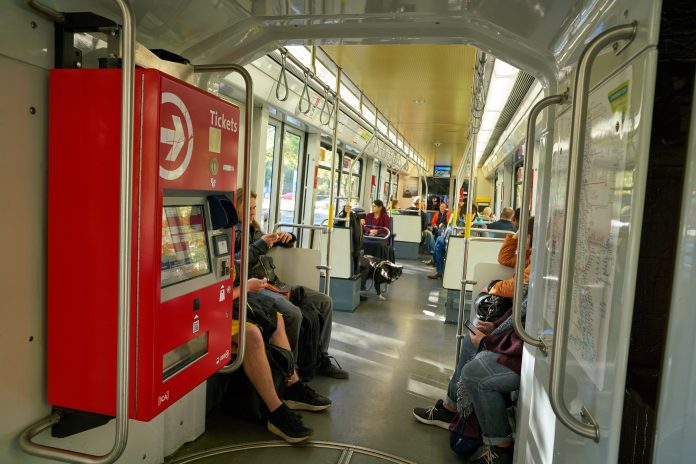Andreas Scheuer, Federal Minister of Transport and Digital Infrastructure, heads up the Federal Ministry of Transport and Digital Infrastructure in Germany. Here, we find out about the exciting future for public transport, intelligent transport systems and ticketing in Germany
Andreas Scheuer is Federal Minister of Transport and Digital Infrastructure (1). Andreas head up the work of department that consists of 63 agencies and as such, his responsibilities consist of the roll-out of digital infrastructure, as well as German road, rail, waterway and aviation policy. (2)
According to the Ministry, local public transport is important because it links rural areas to urban centres and as such, ensures mobility in the countryside. The Federal Government supports the federal states and local authorities in Germany when it comes to promoting innovative developments and financing these services. In the words of Andreas Scheuer, Federal Minister of Transport and Digital Infrastructure: “The quality of local public transport is a benchmark for the quality of life in our cities and rural areas. Local public transport has to be attractive, safe, secure, reliable and affordable.”(3)
So, let’s delve into the world of public transport in Germany, as well as the why the Federal Government is funding innovative developments in the country’s local public transport, in areas such as smart ticketing and intelligent transport systems (ITS).
The quality of local public transport
In the Federal Republic of Germany, responsibility for local public transport (ÖPNV) and its financing lies in principle with the federal states or municipalities. The Federal Government supports the Länder by investing in public transport and ordering local transport services to the tune of around €10 billion a year. These funds will be further increased during the coming years.
In addition, the Federal Government supports local public transport through tax breaks (e.g. VAT reductions) and compensation payments (e.g. for the transport of severely disabled persons). Last but not least, the Federal Government promotes innovation developments in public transport. In an “Immediate Programme Clean Air 2017 – 2020”, for example, it also supports projects that benefit local transport companies. Among other things, it supports the procurement of electric buses, digitisation in local public transport and the retrofitting of diesel buses with exhaust aftertreatment systems.
Innovative developments in local public transport
Public transport is promoted, among other things, to reduce pollutant loads such as nitrogen oxide (NOx) and to strengthen climate protection. The Federal Government is specifically promoting the testing of urban transport and local public transport measures in five model cities (Bonn, Essen, Herrenberg, Mannheim, Reutlingen). The measures focus on their character as experiments for innovative approaches that are to be tested in practice. All projects in the model cities will be accompanied scientifically and evaluated with regard to their NOx reduction potential. The transferability to other cities will be examined. The measures (e.g. ticket discounts, expansion of public transport services) are very positively received in the model cities and increase the attractiveness of public transport enormously. A new climate protection programme in 2030 will massively increase federal funding for public transport. An additional 10 model projects to strengthen local public transport will be supported, such as the introduction of €365 annual tickets.
According to the Ministry, public transport is promoted into network transport services and to develop and establish innovative mobility concepts. This serves to increase mobility, increase the efficiency of passenger transport and improve the comfort and user-friendliness of public transport. In recent years, new and innovative transport concepts and mobility offers have developed, especially in cities. Car, bike and ride-sharing are suitable for supplementing public transport. Multimodal mobility platforms and integrated digital services can make an important contribution to ensuring sustainable mobility in urban and rural areas. In some cases, such mobility platforms initiated by local transport companies already exist.
However, there are only rudimentary regional or nationwide solutions – for which the federal government is committed. Together with the federal states, municipalities, transport companies and associations, industry and customer representatives, the federal government have developed and adopted a roadmap of the same name in an initiative for digital networking in public transport. The Federal Government has contributed financially to the implementation of the measures outlined in the roadmap by supporting projects with a total of €14 million from 2016 to 2018. Priority was given to projects that aim to establish a supraregional and transnational network of passenger information systems and electronic ticketing or to create the corresponding foundations.
In addition, the Federal Government regularly funds numerous research projects in an “Urban Transport Research Programme” that aims to improve public transport. For example, a project to provide timetable data for public transport in a national access point is being supported. After 1 December 2019, all European Union (EU) Member States are obliged to set up such a national access point (NAP) for the cross-border EU-wide provision of travellers with multimodal, high-quality and consistent travel information before and during the entire journey.
Networking with other modes of transport through the innovative use of digital data
Another funding programme, the mFUND, supports numerous projects that can contribute to the improvement of public transport and its networking with other modes of transport through the innovative use of digital data.
With its funding to date, the Federal Government has made a significant contribution to create important foundations for nationwide networked information and ticketing systems. The associations and transport companies are now called upon to implement them.
In addition, innovative mobility services (such as on-demand ride pooling models, call busses and taxis) are to be given a legally secure basis for approval through the modernisation of passenger transport law in order to promote new user-friendly public transport services.
References
1 https://www.bundesregierung.de/breg-en/federal-government/cabinet/andreas-scheuer
2 https://www.bmvi.de/EN/The-Ministry/Federal-Minister-State-Secretaries/federal-minister-and-state-secretaries.html
3 https://www.bmvi.de/EN/Topics/Mobility/Road/OEPNV/local-public-transport-in-a-nutshell.html











